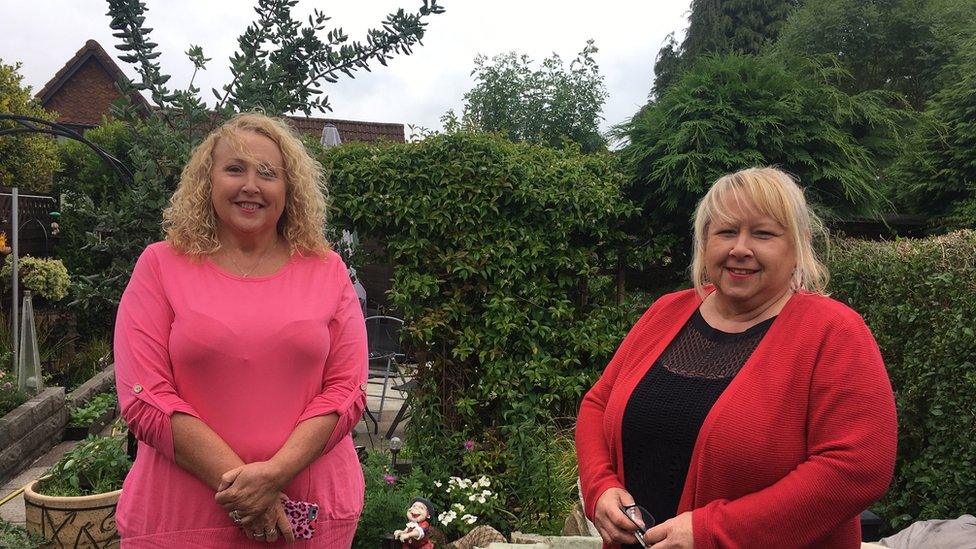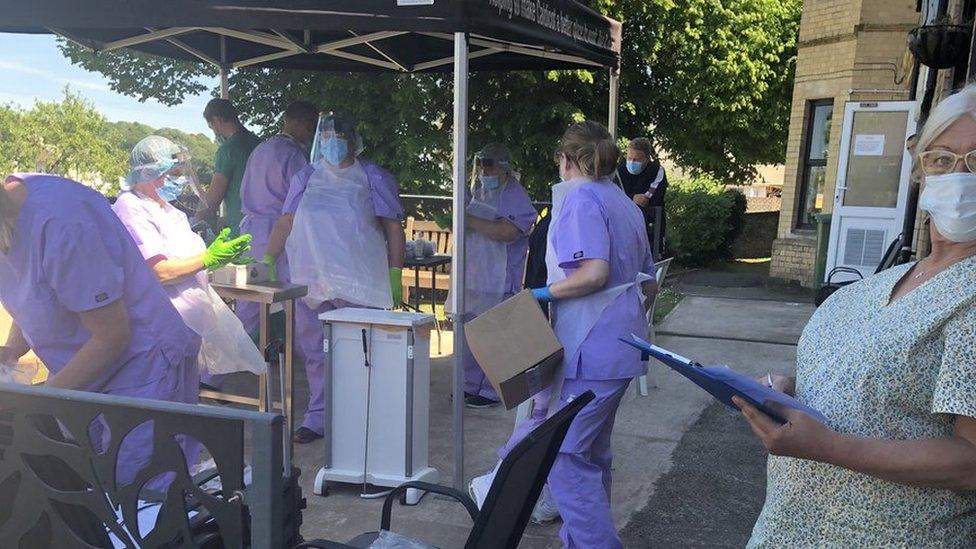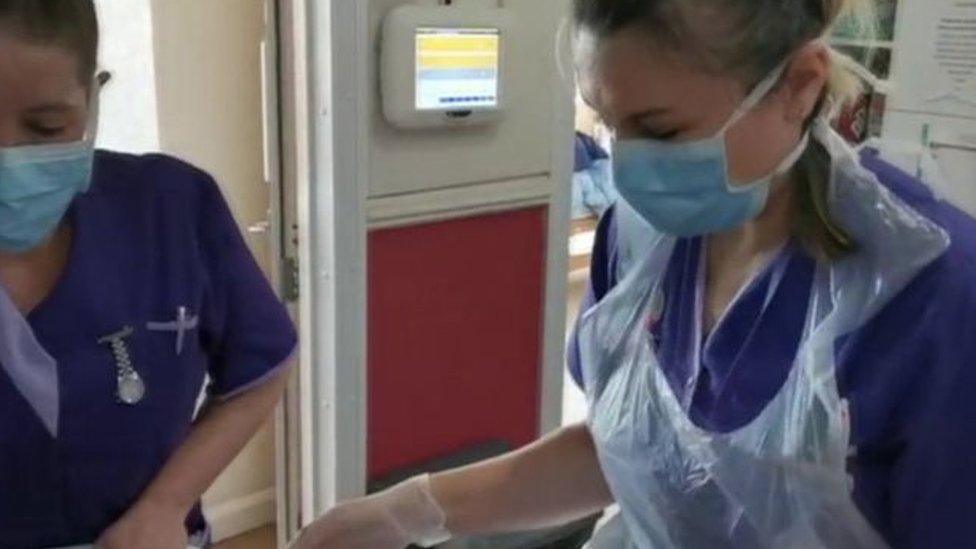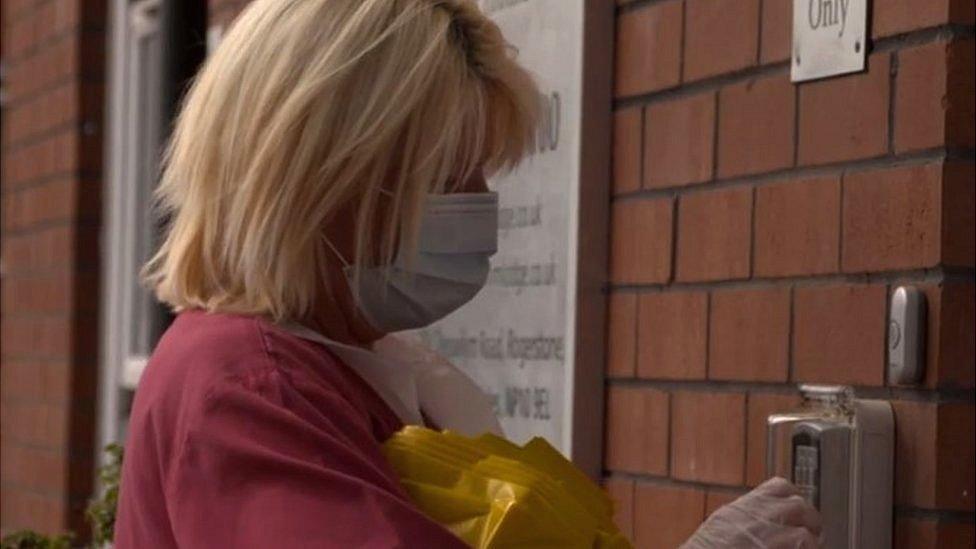Coronavirus: Family 'battled' for test for care home-bound dad
- Published
Coronavirus testing: 'It wasn't just to protect our father'
A family said they faced a "traumatic battle" to get the right coronavirus test to allow their 90-year-old father to be transferred to a care home.
Denis Jenkins was taken to the Royal Gwent Hospital in Newport in May with Covid-19 symptoms but tested negative and was allowed to be discharged.
But his two daughters said they had to make three requests for a "fast-track" test, which the home insisted on.
The Aneurin Bevan University Health Board asked the family to contact it.
Mr Jenkins's daughters, Elaine Thomas and Christine Rusby, said they had to explain NHS testing policies to hospital staff, who said they would not test Mr Jenkins on the day he was due to be discharged.

Mr Jenkins's daughters, Christine Rusby (left) and Elaine Thomas (right) said front-line staff seemed unaware of testing rules
The hospital eventually said it would test Mr Jenkins, from Cwmbran, Torfaen, but the results would take 48 hours to be returned.
Public Health Wales guidelines say patients could become infected after that test has been taken and many care homes require residents to be tested the same day they are discharged from hospital.
'I was horrified'
Ms Thomas and Ms Rusby said they made three formal complaints and spent hours on the phone to ensure their father got a "fast-track" test, which returned a result in two to four hours, which his care home insisted on.
Ms Thomas said the first nurse they spoke to did not appear to understand the testing rules.
"The first comment she made to me was that they had stopped doing the testing two weeks ago, prior to release from hospital," she said.
"The second phone call I had with her, I said 'I've checked online and it is still in place and they request the fast-track test which takes 2-4 hours'. I was horrified.
"We were also lucky that the nursing home was standing their ground and rightly so. Their policy was that it had to be done that day and yet the hospital were doing anything in their power to go against their policy."

Mr Jenkins was admitted to the hospital's "red zone", but recovered from his illness
Ms Rusby said: "I spoke to numerous people, doctors, nurses, you name it. I was told that he didn't clinically meet the need to be tested and fast tracked. Which I think is unbelievable.
"They were adamant that this was their new policy that it was only a 48 hour test.
"It was horrendous. It was emotionally charged to say the least. And the last thing you need is to fight. It's astounding that they were still willing to let him go out with a 48 hour old test.
The latest figures show 62% of coronavirus tests in hospitals come back within 24 hours, external.
What are the current rules on testing and care homes?
Official guidelines published earlier this month say everyone discharged from hospital to a care home should be tested, even if they were not admitted to hospital with the virus.
The guidelines do not specifically say a same day test is necessary, however they do say that "where the test was taken 48 hours in advance of discharge the patient could become infected after the test has been taken".
Regardless of the outcome of the test, the person will be cared for in isolation for 14 days on their return to the care home because the tests are not completely accurate.

SCHOOLS: When will children be returning?
EXERCISE: What are the guidelines on getting out?
THE R NUMBER: What it means and why it matters
AIR TRAVELLERS: The new quarantine rules
LOOK-UP TOOL: How many cases in your area?

A spokesman for the health board said: "We are sorry to hear about these concerns raised by the family of Mr Jenkins and we would urge them to contact us directly so we can look into this matter.
"We have worked with and our five local authorities in Gwent to develop a standard operating procedure to support timely, safe discharges from hospital into care homes. This procedure is compliant with Welsh Government guidance.
"The health board is actively working to ensure that all staff are aware of the content and expectations of this procedure, acknowledging that new guidance is being updated at a fast pace."
Mario Kreft, chair of Care Forum Wales which represents hundreds of care providers, said policy changes do not always filter down to front-line staff.
"Clearly, I think communication is an issue," he said. "As guidance is changing, as there are individual interpretations across Wales, we don't seem to have that level of consistency, naturally people are confused.
"And this level of confusion can only lead to delays in the discharge of care and that has a whole ramification of issues."
The Welsh Government said: "Our policy for testing in care homes has adapted as the scientific evidence has changed. Communication is essential in what is a very fast-moving situation.
"We work with our partners before announcing policy changes and ensure they are provided with accurate, timely and up-to-date information."
- Published31 May 2020

- Published5 June 2020

- Published21 May 2020
